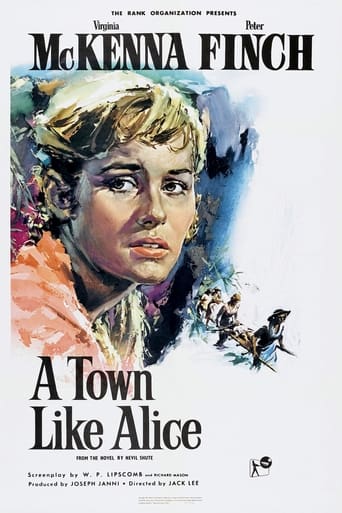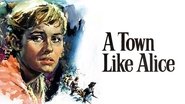tersokol
Not really a spoiler, but I was originally disappointed when I realized this movie was concentrating on just the death march portion of the book. Very warm and heartfelt, but kind of misses the point of the title, which is really about what happens after the movie version ends. The mini series gave a better overall translation. An alternate title for the book was The Legacy, and that might have suited this version better. Still good though. By the way, Jean was not a nurse, she was a secretary, and Joe was not from Alice Springs -- it just represented a sort of ideal to him. He was from Willstown, and hoped it would one day develop into a town like Alice.
Roger Burke
Soon after the end of real hostilities in 1945, Hollywood produced the first of many subsequent films from the perspective of prisoners of war held by the Japanese: that film was Three Came Home (1950) with Claudette Colbert. I recall seeing that one a long time ago and recall the dark nature of that narrative (I have yet to submit a review here, but I will, in time).A Town Like Alice is a different kettle of fish, so to speak: instead of a single family, it's a mix of various women and children caught up in the retreat to Singapore in 1941, and follows their seemingly unending trek across Malaya, from camp to camp, seeking admission and a final resting place to wait out the war.The black and white photography is superb as the downtrodden party weaves its way through swamp, dirt roads, wet and dry season, very little food or water, malaria, dysentery and all other manner of tropical diseases. Little wonder that, as they walk, they also die, one at a time, from malnutrition and sickness, and all the while, their guard, an old-timer, gradually comes to admire their perseverance just as the women come to respect the old man's quiet determination to keep helping them to survive. That's the main story.The big sub-plot is how Jean Paget (Virginia McKenna) meets Joe Harmon (Peter Finch), also a prisoner of war, and how they both come to fall in love – on the run, if you know what I mean: they keep meeting (he is pressed into service as a driver for the Japanese) at different parts of Malaya as the women keep wandering around, looking for a place to stay. So, there is a bit of comedy from the irrepressible Aussie soldiers, mixed with moments of real tension as the two lovers try to keep a relationship going under such conditions. And, it's during one of those meetings that Jean learns that Joe comes from Alice Springs.Never boring, and with stand-out scenes, such as one of the little boys running in between the advancing Japanese soldiers with his toy gun, shouting "bang, bang" (reminiscent of Brandon de Wilde in Shane [1953], doing the same thing, and annoying Jean Arthur, inside the farm house); the joy of the women when they come across an abandoned house with hot running water; and, Jean's bargaining with a Malay shop-keeper for tinned milk for a baby.If this period in history is of interest, you could do worse to spend two hours of your time. And, as for how the romance turns out, well, you'll just have to see the movie, won't you?
GrandeMarguerite
I have just posted a comment on "Merry Christmas Mr Lawrence" directed by Nagisa Oshima in the early 1980s. The main originality of MCML does not lie in its subject, as other films have dealt with Prisoner-of-War camps under the Japanese rule, the most famous of them remaining "The Bridge on the River Kwai" by David Lean (1957). As MCML is a much more recent film, it might be considered as a more realistic approach to the daily life in a camp under such circumstances; yet realistic films on this subject appeared as early as in the 1950s with works like "A Town like Alice" directed by Jack Lee, which was rejected in its time by the Cannes Film Festival for its shocking content and violence — a sharp contrast with often romanticized productions where war has a glamorous aspect. "A Town like Alice" is also original for it tells war from the point of view of women, and women in conflicts are often ignored by war movies.It has been years now since I watched "A Town like Alice". I remember it as a good and honest film about the conflict with the Japanese in the Far East. Virginia McKenna as a British nurse and Peter Finch were both convincing. It may be not the best film on WWII, yet it has an authenticity and favors a psychological and realistic approach to the characters than can attract many viewers, not just war movies freaks.By the way, the title is a reference to the town of Alice Springs, where the story ends.
Jools-10
This film is in the same league as the series Tenko for it's realism. I have also watched the mini series which could have it's moments too but the film wins because of the fact that it was made around a decade after it had happened, when things must have been quite fresh in everyones minds. These women were taken captive as the men were but they were not wanted by anyone. These women were far away from home with no clothes apart from what they stood up in, no money and they didn't speak the language. Given those fact the thoughts are so scary!


